
When Ryan Scoble was a junior lacrosse player at Mercyhurst University, he came home to Cincinnati for winter break eager to see his father.
Ryan’s dad, Steve, had dilated cardiomyopathy, a condition in which the heart muscle becomes weakened, then enlarged.
Steve had surgery to implant a machine called a left ventricular assist device, or LVAD; it essentially does the work of the left side of the heart. He was waiting for a heart transplant. And he was recovering from a stroke.
While home, Ryan spent time with his dad, ran several times a week, and signed up for a local men’s lacrosse league.
During a game, he rolled his foot, fracturing it in several spots. Back at school in Erie, Pennsylvania, he sat on the bench for four weeks, healing.
Finally on the lacrosse field again at school, Ryan was out of breath. He struggled through warm-ups. He blamed it on his pollen allergy and his time away from training as his foot healed.
But he also woke up at night breathing hard. His heart pounded. It was stress, he thought.
During one of his first games back, Ryan was dragging on the field. He couldn’t finish plays. He looked pale. His coach took him out of the game.
The next day, a trainer took Ryan to get an X-ray. Upon receiving the results, the trainer called Ryan and said, “We’re going to see the team doctor first thing tomorrow morning, and I’m driving you.”
At the doctor’s office, Ryan got an electrocardiogram, or EKG, a test that uses electrodes on a person’s chest to create a zigzag-lined readout of the heart’s electrical signals. It showed that his heart was swollen and struggling to pump blood.
Maybe I have what Dad has, Ryan thought.
In the local emergency room, he had an echocardiogram to measure how blood was flowing through his heart. The doctors told him he had severe heart failure and to call his parents.
Ryan’s mother, Kelley, drove five hours to Erie, arriving after dinner. Her first reaction was denial. Rest or medication could fix her son, she thought.
“It’s OK, it’s all going to be OK,” she told Ryan.
“How is this going to be OK?” he replied, through tears. “I’m 21 years old and my heart is failing!”
Ryan was discharged the next day. Kelley drove him home to Cincinnati. He met with Steve’s cardiac team and started taking heart failure medication.
Maybe his heart would improve since he was young and otherwise healthy. Doctors would monitor him.
When Ryan returned to school to pack up, he caught a virus. Back home, he napped after arriving. When he woke up, his vision blurred. He was confused. His heart raced.
In the ER, doctors said the virus attacked his heart. He was in cardiogenic shock, which is when the heart can’t pump enough blood and oxygen to the brain and other organs. His heart was too thick and swollen for an LVAD, the device his dad had.
“The only effective path forward is a transplant,” his doctor said.
Ryan was transferred to a larger hospital in Cleveland and joined the heart transplant list. Dark days followed as Ryan feared he would die waiting for a new heart.
On Mother’s Day in 2021, with his mom by his side, Ryan got the call. A match was found. He was getting a new heart.
The surgeon asked if Ryan had any requests.
Ryan’s lacrosse team loved the song “Kickstart My Heart” by Mötley Crüe. He asked the surgical team to play it once his new heart was in.
The day after the operation, Ryan got out of bed and walked. Back home in Cincinnati, he did cardiac rehabilitation for two months. By the end, he felt back to his old self.
Around that time, the family got “the call” again. A match was found for Steve to get a heart transplant. In his recovery, Steve used Ryan as his role model for perseverance, grit and determination.
“I learned you have to keep moving forward each day no matter if it’s an inch, a foot or a yard,” Steve said.
In the fall of 2022 – 18 months after his transplant – Ryan returned to the lacrosse field at Mercyhurst, strong and with his breath. His team made it to the national championships. Ryan graduated this year with a degree in business management.
“His goal-oriented attitude really contributed to his recovery,” Steve said.
Now, Ryan is on the job hunt and living in Cincinnati. With his lacrosse days behind him, he’s setting new physical goals. His latest: to train for a triathlon.
“I want to keep finding ways to push hard physically and mentally and to grow from this experience,” he said. “And I want to keep that energy moving forward. I look at this experience as an enhancer rather than something that was taken from me.”
Written by Deborah Lynn Blumberg.
If you care about heart disease, please read studies that herbal supplements could harm your heart rhythm, and how eating eggs can help reduce heart disease risk.
For more information about heart health, please see recent studies that apple juice could benefit your heart health, and results showing yogurt may help lower the death risks in heart disease.
Follow us on Twitter for more articles about this topic.



